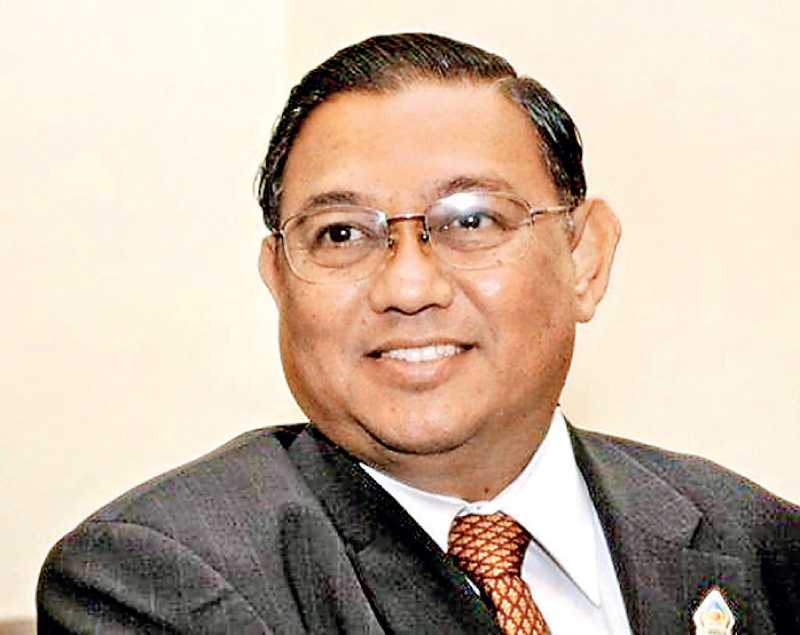Tuesday Feb 24, 2026
Tuesday Feb 24, 2026
Monday, 15 March 2021 01:41 - - {{hitsCtrl.values.hits}}

Myanmar Junta’s Foreign Minister Wunna Maung Lwin
“A great deal of world politics is a fundamental struggle, but it is also a struggle that has to be waged intelligently” – Former US National Security Advisor
 Sri Lanka’s Foreign Office made the news again this past week with the announcement that an invitation had been extended to the Myanmar Junta’s Foreign Minister, Wunna Maung Lwin. The invitation was for the upcoming Bay of Bengal Initiative for Multi-Sectoral Technical and Economic Cooperation (BIMSTEC) virtual meeting.
Sri Lanka’s Foreign Office made the news again this past week with the announcement that an invitation had been extended to the Myanmar Junta’s Foreign Minister, Wunna Maung Lwin. The invitation was for the upcoming Bay of Bengal Initiative for Multi-Sectoral Technical and Economic Cooperation (BIMSTEC) virtual meeting.
With Myanmar in the middle of a bloody military coup, which has seen as many as 18 protesters allegedly killed by the military, the outcry from the Sri Lankan public was swift.
Led by Opposition Leader Sajith Premadasa, who called on the Government to immediately rescind the invitation, the online mediums were soon full of netizens criticising the Government’s foreign policy stance. For those who have, rightly, condemned the ongoing violence and suppression of Democracy in Myanmar, their calls to discard the country’s obligations appears more of a knee-jerk reaction with the hope of scoring political mileage.
Sri Lanka’s responsibility
As Chairperson of BIMSTEC, Sri Lanka has the responsibility of hosting the summit. With the organisation having made no change to the current status of Myanmar’s membership, the host nation has the obligation to ensure all member states are extended an invitation.
While the optics of such an invitation is certainly poor, the Sri Lankan Foreign Office has deployed the argument of not having a “mandate” to exclude Myanmar. The Government’s deference to international obligations has come at an interesting juncture in the country’s global political journey.
In a couple of weeks Sri Lanka will face a vote at the 46th Session of the United Nations Human Rights Council (UNHRC). The resolution which is to be taken up on Sri Lanka has been based, in part, on the country’s failure to adhere to its obligations to international laws and human rights.
The invitation to Myanmar has clearly demonstrated that this Government can adhere to its international commitments, a trait that has been found wanting in the past.
It was only last month that the Sri Lankan Government unilaterally decided to cancel the tripartite agreement signed with India and Japan to jointly develop the East Container Terminal at the Colombo Port. The decision was met with anger from both countries. In a separate communique issued by the Indian Government regarding the early conclusion of a currency swap with Sri Lanka, the opportunity was taken to indirectly remind the Sri Lankan authorities of their international obligations. A stern warning to the administration that the international stage was not for amateurs.
 Indian angle
Indian angle
The decision by the Cabinet of Ministers to forgo international obligations and risk the anger of the country’s closest and largest ally, was built on the back of support from its political base. It has since emerged that India, which voted against Sri Lanka at the UNHRC in 2012 and abstained in 2014, is considering voting once again.
President Gotabaya Rajapaksa has sought out India’s assistance by writing to Prime Minister Narendra Modi requesting their support. With no official response to the President’s request, India is keeping the pressure on the Rajapaksa regime.
India’s stance at the UNHRC will certainly be influenced by the upcoming State Assembly elections in Tamil Nadu. However, Sri Lanka’s recent failings in their international obligations will play its own role. With the COVID-19 pandemic allegedly originating from China, and India leading the global vaccine drive, the sub-Continental giant finds itself in a position to take a lead in Asian affairs.
For India to be taken seriously, however, it would need to ensure that its neighbour states fall in line – something China has managed to do successfully in the South-China Sea. With Pakistan and India on a continual war footing, the onus is on the Modi administration to gather its remaining neighbours.
Pressure is mounting on the Rajapaksa administration from the UNHRC. India’s refusal to states its intentions appears to be Modi’s way of pulling Sri Lanka back in line with their plans for the region. The country’s failure to honour its obligations to India has resulted in the Modi Government putting away the proverbial carrot, and now resorting to the stick. In the case of the upcoming BIMSTEC Summit, if Sri Lanka were to rescind the invitation to the Myanmar Government, it would add further fuel to the fire raging under the Indo-Lanka relations. India, since the 1990s, has been reliant on its relations with Myanmar to ensure a close watch on what it believes to be China’s encroachment into the Bay of Bengal. If Sri Lanka were to discard its international duty and publicly reject Myanmar, it would only serve to further weaken any chance of India backing Sri Lanka at the UNHRC.
Regaining lost ground
The Sri Lankan Foreign Office has the opportunity now to regain lost ground on the international stage. Myanmar has already seen a resolution unanimously adopted against themselves at the UNHRC, calling for the release of their political prisoners and a halt in violence.
With public support absent amongst the international community for the Myanmar Junta, the Sri Lankan Government will need to act responsibly while adhering to their duties as Chairperson of BIMSTEC. Using the side-lines of the upcoming Ministerial level engagement with Myanmar, the Government would not be off pace if they were to address the ongoing coup in the country.
Sri Lanka enjoys relations with Myanmar dating back to the 4th Century, sharing a common religion as well as the unwanted fact that both countries are the subjects of UNHRC resolutions. As such, Sri Lanka finds itself in the unique position of being able to address the country on an even keel. However, whether the Foreign Office is willing or capable of engaging in a meaningful dialogue with Myanmar remains to be seen.
Regardless of whether Sri Lanka addresses the ongoing crisis in Myanmar, the decision of whether it will once again turn its back on its international obligations will be closely monitored. For a regime that has shown itself willing to shelve its responsibilities to the international community in lieu of public support, the growing calls to rescind the invitation will need to be ignored.
If the Government of Sri Lanka were to address and express its opposition to the ongoing coup in Myanmar, while continuing to adhere to its duties as Chairperson of BIMSTEC, it will illustrate a level of international diplomacy not previously demonstrated by this current administration.
A failure to put aside political gains on the domestic stage in place of upholding its commitments to the international community will be yet another addition to its growing list of diplomatic blunders.